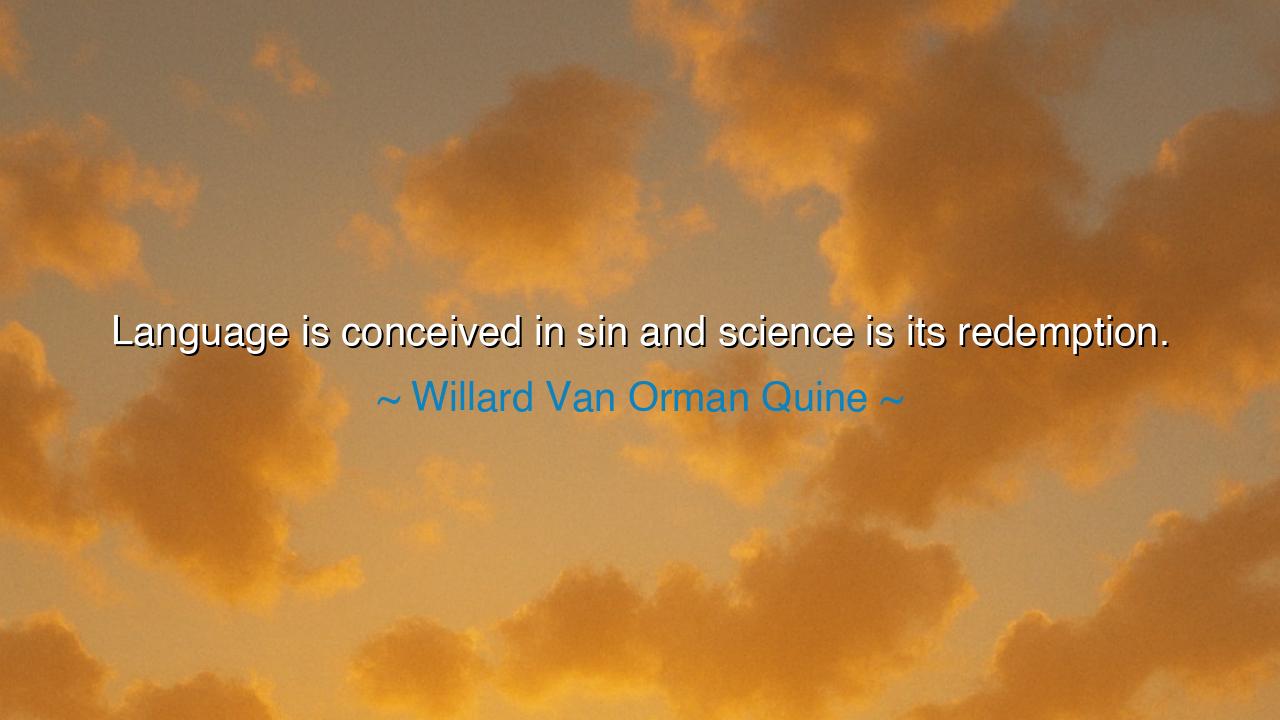
Language is conceived in sin and science is its redemption.






Listen, O children of wisdom, to the profound words of Willard Van Orman Quine, who speaks with clarity about the nature of language and science. He says, "Language is conceived in sin and science is its redemption." These words are a call to understand the very nature of language—not simply as a tool for communication, but as something deeply flawed, something that often distorts the truth. Quine’s words carry with them the weight of an ancient truth: that language, though essential to the human experience, has a tendency to mislead, to obscure, and to trap us in false interpretations of reality. Science, in turn, offers the redemption—the path to clarity, to truth, and to the unraveling of the mysteries that language alone cannot explain.
In the time of the ancients, Socrates and his followers recognized that language was not simply a medium for conveying ideas but was also a source of misunderstanding. Socrates often engaged in dialogue with his fellow Athenians, revealing how words, when not carefully defined or properly understood, could lead people astray. In his Socratic method, he sought to clarify the meanings of words and the ideas they conveyed, for he understood that if we cannot agree on the meanings of our language, we cannot truly understand each other. This struggle to define and purify language is what Quine refers to when he speaks of language being “conceived in sin.” The very structure of language, with its imprecision and its ambiguities, often obscures the truth, leading us away from understanding rather than toward it.
Consider the example of Plato, who, in his dialogues, sought to use language not as an end in itself but as a means to uncover deeper truths. In his writings, Plato often explored the limitations of language and how it could only ever point toward the forms, those perfect and unchanging realities beyond the material world. Plato’s work reflects the notion that language alone cannot capture the essence of reality—it can only hint at it. For the philosopher, the truth lay not in the spoken or written word, but in the deeper understanding that transcended language itself. This search for a more accurate representation of the world through reason and philosophy echoes the idea that science can offer us a clearer view of the world, free from the distortion of language.
Now, O children, Quine’s words also reveal a powerful insight about the role of science in human understanding. Science is the pursuit of truth through observation, experimentation, and rational inquiry. It is the tool that allows us to peer beyond the veil of language and reach toward the underlying facts of the world. Just as Copernicus and Galileo used the language of mathematics and observation to reveal that the Earth was not the center of the universe, so too does modern science use a language that is precise and grounded in empirical evidence. This, Quine tells us, is the redemption—the path by which science frees us from the limitations of ordinary language and brings us closer to truth.
In the modern age, we see science continually redeeming language by refining our understanding of the world. Einstein’s theory of relativity, for example, transformed the way we understand space, time, and gravity. Before Einstein, our language of Newtonian physics seemed sufficient to describe the world, but it was found to be inadequate in explaining the behaviors of the cosmos at extreme scales. Einstein’s work was not merely a matter of new words; it was a profound shift in how we understood the very fabric of reality. Through the scientific method, we are given a language that, while still imperfect, brings us closer to the truth than ordinary language ever could.
And so, O children of the future, take this lesson to heart: language is an indispensable part of the human experience, but it is not infallible. It is, as Quine suggests, often flawed, limiting, and prone to misunderstanding. To truly understand the world, we must turn to science, to the language of observation, experimentation, and reason. Yet, let us not forget that science itself is a tool, not an end in itself. Just as Socrates sought to clarify language through dialogue, so too must we strive to use the tools of science wisely—always seeking truth, always questioning, always refining our understanding of the world.
Let your lives be a reflection of this wisdom: use the power of science to uncover the truths that language alone cannot reveal. Do not be satisfied with the surface of things; dig deeper, explore further, and seek the truth that lies beyond the words. In this way, you will find the redemption of language—not in its perfection, but in its ability to point us toward the deeper realities of the world. Through science, may you see the world as it truly is, unclouded by the sin of language's limitations, and may you become a beacon of knowledge and clarity for all those who seek the same.






AAdministratorAdministrator
Welcome, honored guests. Please leave a comment, we will respond soon